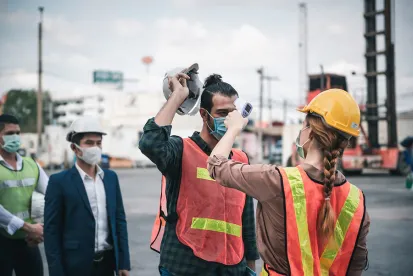Employers grappling with the many questions related to bringing employees back into the workplace safely in the midst of the COVID-19 pandemic should pay close attention to the potential wage-and-hour risks attendant to doing so—including whether to pay employees for time spent waiting in line for a temperature check, verifying vaccination status, or completing other health screening inquiries.
Given the growing trend of COVID-19 lawsuits, ignoring these risks could leave employers vulnerable to costly class and collective action litigation.
What the Law Requires
Under the Fair Labor Standards Act (FLSA), employees must be paid for (1) their time performing their “principal” work activity and (2) any time that is an “integral and indispensable part” of their principal work activity. By contrast, employees are not entitled to compensation for time spent performing activities that are “preliminary” or “postliminary” to their principal work duties.
In the leading case Integrity Staffing Solutions v. Busk, the U.S. Supreme Court clarified the meaning of each of these terms.
“Principal activities” are those the employee is employed to perform. An activity is integral and indispensable “if it is an intrinsic element of the [employee’s principal] activities and one with which the employee cannot dispense if he is to perform his principal activities.”
In Integrity Staffing, the Supreme Court held that mandatory post-shift security checks for warehouse employees were not compensable under the FLSA because they did not constitute a principal activity and they were not integral and indispensable to the workers’ primary work of retrieving products from shelves and packaging those products for delivery to customers, even though the employer required the screenings to prevent employee theft.
Notwithstanding Integrity Staffing, state laws may deviate from federal law as to what qualifies as compensable work time. In California, employees generally are entitled to wages for time spent waiting in line for an anti-theft security check after their shift, according to the California Supreme Court in Frlekin v. Apple, Inc.
These seemingly diametrically opposed holdings in Integrity Staffing and Frlekin stem from the way federal and California state law define “work.” Rather than adopt the “principal” or “integral and indispensable” framework, California law defines “hours worked” as all-time that employees are subject to the control of an employer. Because the employees in Frlekin could not leave the premises until they went through the security check and were subject to discipline if they failed to comply with the security requirement, the California Supreme Court concluded they plainly were under the employer’s control, and therefore, were entitled to wages for their security check time. Other states similarly may diverge from federal law as to whether such time is compensable.
Integrity Staffing In the Time of COVID-19
Historically and typically, this classic wage-and-hour issue has arisen in contexts such as donning and doffing of protective equipment and waiting in line for security checks. Recently, it has appeared in a new form: COVID-19 health screenings.
The crux of the issue is whether employees are entitled to wages for their time spent waiting in line for a temperature check or completing some other form of health screening: is measuring an employee’s temperature or verifying vaccination status a “principal activity,” or is it a “preliminary” or “postliminary” activity? On their face, a temperature check, vaccine status verification, and questionnaire about COVID-19 symptoms are not “principal activities,” nor are they intrinsic elements of principal activities in most workplaces, such as warehouses, factories, financial institutions, and retailers. Related issues include (1) whether and to what extent the screening activities are pursuant to government mandates or other guidance and (2) whether the time spent on these activities is de minimis and thus not compensable even if it might otherwise qualify as work.
As of now, it does not appear that any federal or state court has weighed in on whether such COVID-19 related inquiries, and the time spent completing them, are compensable under federal, state, or local law. With the rising tide of COVID-19 related litigation, employers should expect this issue to arise and a court pronouncement on the issue in the near future.
In the meantime, employers should review their health screening policies and procedures. Employers also should review the specific state wage-and-hour laws in jurisdictions where they operate to determine how those laws define compensable work time.




 />i
/>i
